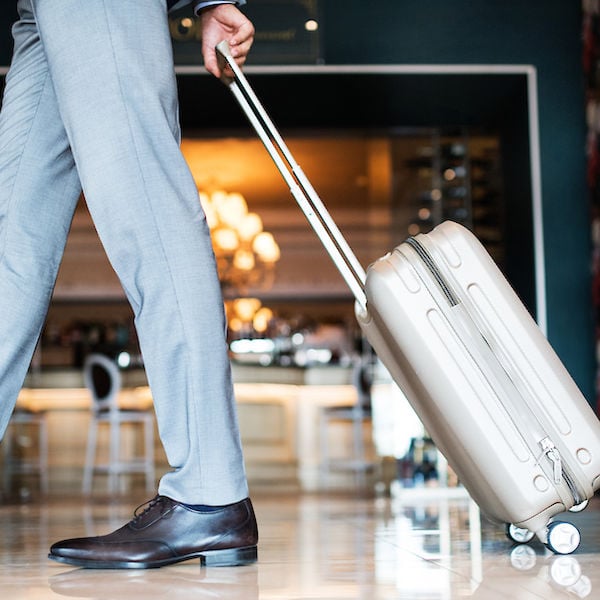Checklist for Traveling with Prescription Medication Overseas
Checklist for Traveling with Prescription Medication Overseas

If you take any type of medication consistently, whether it’s an over-the-counter or prescription drug, you need a plan in place for bringing it across borders. Some over-the-counter medicines in one country could require a prescription in another. Some drugs commonly prescribed in one area could be illegal in another. Other countries may not manufacture the type of medication you need, which can make traveling with prescription medication overseas difficult.
You might want to use a workaround such as having a friend or family member ship you medication, but you could be breaking the law. You need to pay close attention to government rules and regulations around shipping and bringing medications into a new country to avoid potential consequences. Traveling with prescription medication overseas takes careful planning.
To help maintain your health while staying out of trouble, you should first prepare at home. Before moving abroad or traveling for an extended period, make sure to talk to your prescribing doctor about your medicines, get a good insurance policy in place, know the laws in your destination and organize your documents.
Speak With Your Prescribing Doctor
As you prepare for traveling with prescription medication overseas, schedule a planning appointment with your doctor weeks or even months before you leave. Discuss the prescription medicines you take and your options for bringing them with you.
In some cases, your doctor may be able to prescribe you more medicine than usual. With pills, for example, your provider could write a refillable 90-day prescription rather than a 30-day prescription or give you some extra samples. Your doctor might also prescribe you a larger dose of medicine and give you 20 mg pills rather than 10 mg pills and ask you to split them, so they’ll last longer.
If your doctor cannot legally prescribe enough medication to last your full stay, they can recommend an alternative to look for in the other country. If you get international health insurance before traveling or moving, your doctor can also tell you what to ask a new prescriber about to replace your current medication with the same effects.
You should also talk about the non-prescription medicines you take in case they’re unavailable or banned in your destination country. Your doctor may be able to write you a new prescription or a letter explaining why you need the medicines. They can use the same strategy as above and give you an alternative depending on the active ingredient if a certain brand is unavailable.
Which Medications are Illegal to Bring Abroad?
Some drugs are available over the counter in one country and unavailable or banned in your destination country. In the United States, for example, you can buy Sudafed at a local pharmacy or grocery store. In Japan, however, you’re not allowed to bring Sudafed over the borders or you’re breaking the law. Stimulants such as pseudoephedrine, the active ingredient in Sudafed, are also illegal in Colombia and Mexico.
Other commonly used medications often banned in other countries include sleep aids such as Ambien, attention-deficit disorder medications such as Adderall and Ritalin, and pain relievers such as OxyContin and Vicodin.
Medication requiring syringes or other equipment such as a diabetes pump might also need to be pre-approved before entering a new country.
If you do not comply with the rules and regulations while traveling with prescription medication overseas, your drugs may be confiscated. Even worse, you could face a fine, deportation or jail time.

Request Permission From the Embassy
If your medication is banned in your destination country but vital to your care, you can request to bring it in by contacting your home country’s embassy. You can also contact the embassy for help bringing larger quantities of your medicine in if the destination has a cap. If you’re struggling with how to travel with prescription drugs internationally, the embassy should be able to answer your questions.
You may also be wondering; can you send medication overseas? Many governments such as the United States do not allow you to mail medication. Only the DEA can ship medication. Other countries may be looser, however, depending on your documented medical necessity. The answer depends on your response from your home country’s embassy.
Secure Comprehensive International Health Insurance
With the rise of telemedicine, you may feel like setting up a virtual doctor’s appointment with your provider from home. Government regulations, however, do not allow doctors to treat patients across international borders.
If your doctor cannot send you to a new country with enough medication to last your full stay, you might need to seek out a new prescription in your destination. Visiting a doctor without health insurance, however, is expensive. And so is paying out of pocket for medication.
Before seeking out care outside of your home country, it’s important to invest in international health insurance. If you choose a solid comprehensive plan, your insurance company can help you locate in-network prescribing doctors abroad. If you’ve chosen a plan above the basic option, your insurance should also cover part or all the cost of your new prescription drugs. Having insurance also helps financially protect you from other costs such as lab tests if you need any before taking or to monitor your health while taking a new drug.
Organize and Document Your Prescriptions
Whether you’re bringing your own medicine abroad with you or will find a replacement after you move, there are general tips to follow either way. Make sure you know what you’re taking, and it’s been properly documented so you can best prepare to move abroad.
Before traveling with prescription medication overseas, it’s important to:
- Keep your medicines in their original containers
- Bring copies of your prescriptions with you
- Have a letter from your doctor explaining why you need your medicines
- Ensure your drugs have your full passport name on them
- Know the real name of your medication, not just the brand name
- Be able to identify the active ingredient in your medicine and correct dosage
When it comes to how to travel with prescription drugs internationally, having proof the drugs belong to you is highly important. Correct documentation goes a long way if anyone at customs questions your medication or devices.
If you do your research before moving and connect with the right people, you should be able to maintain your health abroad. Unprepared people run into the most issues while trying to bring any type of medication in and out of a new country. If you realize the restrictions prevent you from receiving the best care, it might be time to reevaluate your travel or move plans because your health comes first.
How to Travel with Prescription Drugs

Traveling with prescription drugs internationally isn’t just as easy as packing up your toiletries. So how can you best pack up medicine for pain relief, allergies, or those prescriptions for more serious or chronic health conditions? Below you’ll learn how to travel with prescription drugs the safe way. Here are the rules you must follow to stay within the law:
Air Travel with Medication
Need to travel with prescription drugs but have to board a plane? Find out in advance what the rules are to get through security checkpoints and board the aircraft without issue.
Review the airline’s policy to make sure your prescriptions are allowed before you reach the gate. The TSA recommends clearly labeling medications. Your name should also appear on the prescription bottle. The same guidelines apply to vitamins and supplements too.
TSA Tips for Flying with Prescription Drugs
The Transportation Security Association’s website also lists the following tips for traveling with prescription medications:
- It is not necessary to present your medication to or notify an officer about any medication you are traveling with unless it is in liquid form (See next bullet).
- TSA allows medication in liquid form in carry-on bags in excess of 3.4 ounces in reasonable quantities for the flight. It is not necessary to place medically required liquids in a zip-top bag. However, you must tell the officer that you have medically necessary liquids at the start of the screening checkpoint process. Medically required liquids will be subjected to additional screening. Extra screening often includes opening the container.
- Medication is allowed in pill or solid form in unlimited amounts as long as it is screened.
- You can travel with prescription drugs or medication in both carry-on and checked baggage. Place these items in your carry-on in the event that you need immediate access.
- TSA does not require passengers to have medications in prescription bottles, but states have individual laws regarding the labeling of prescription medication with which passengers need to comply.
- Medication is usually screened by X-ray; however, if a passenger does not want a medication X-rayed, he or she may ask for an inspection instead. Be sure to request inspection before sending any items through the X-ray tunnel.
- Airport security also permits nitroglycerin tablets and spray (used to treat episodes of angina in people who have coronary artery disease). Such medications have never been prohibited. (Source: TSA)
Packing Medicine for Travel
Ask your physician for a letter that explains your medical conditions and the medication required. Keep the letter in your carry-on luggage. This way, you’ll be prepared if you are questioned at security checkpoints or during customs screenings.
Also, consider environmental factors that may affect your health condition or medicine like altitude and humidity. Your doctor may want to make adjustments to your prescription.
If you have a condition that could flare up during your flight, be sure to wear a medical alert bracelet that states your conditions, medicines, treatment and physician’s contact information. Your flight attendants will have a better understanding of what is happening in an event where you are unable to explain your condition during an emergency.
Taking Medication Overseas
Finally, before taking medication overseas understand the laws for bringing prescriptions and other medicine to a destination. Some countries ban or regulate even the most common over-the-counter medicines. The United Arab Emirates, Singapore, and Japan are some of the stricter countries. For example, it is illegal to bring into Japan even common allergy and sinus medications like Sudafed and Vicks inhalers. Other prescription medications, such as Adderall, are prohibited in Japan. Singapore does not allow medicinal chewing gums (Nicotine gum). Any controlled substance requires pre-authorization.
The United Arab Emirates also has a long list of banned substances and may arrest any person who brings prohibited medicines. Restrictions include even over-the-counter medicines containing codeine or similar narcotic-like ingredients.
In a recent New York Times article, “How To Make Sure You Travel With Medicine Legally” noted that travelers are best off consulting with their physician or local pharmacist in addition to the embassy of the destination country. Some countries, like Singapore, may even require pre-approval to take certain medicines or other medical equipment.
Bottom line — taking medication overseas legally is important. So, do your research well in advance of your trip. The U.S. State Department is a good resource. For embassy information, check the travel advisory resources page on InsureMyTrip.
Related Articles

Tips for Coping with the Fear of Flying

Tips for Packing for a Flight

Flight Rights: What to Know When You’re Bumped from a Flight
Ask an Expert
Be the first to ask a question for this subject.
It looks like you are getting insurance for only one day of travel, is this correct?
We use cookies to enhance your user experience. By using our site and/or accepting here, you are agreeing to our updated Privacy Policy.
Can you travel to europe with prescription drugs
SAI Vice President of Enrollment Services, Micaela Kliegl, provides an in-depth look at how to transport your medicine on your study abroad adventure.
While it’s not as fun as planning weekend trips to the Amalfi Coast or practicing those language skills with the Duolingo app, understanding how to bring medicine to Europe is often overlooked, but an oh-so-important detail. Trust me, the last thing you want is to be caught in a European airport (without the right documentation) with a semester’s supply of illegal prescriptions (mood killer.)
Below are some important questions and guidelines to follow, to ensure you’re all set!

What medication should I be careful bringing?
It’s important to understand that some U.S. prescriptions are actually considered illegal narcotics in Europe, such as Adderall and other stimulant drugs used to treat ADHD/ADD. Even if your U.S. doctor prescribed these medications legally to you in the U.S., that won’t fly in Europe. You can still bring them legally, but you need to have the right documentation. Medications to be especially aware of include:
- ADHD/ADD medications (*Adderall, Concerta, Ritalin) *considered illegal narcotics in many European countries
- Pain medications (Vicodin, Oxycontin, Demerol)
- Anxiety medications (Xanax, Ativan, Valium)
How do I bring my medication into Europe?
To ensure legal transport and possession in Europe, especially if you are bringing Adderall (or any medication considered an illegal narcotic in Europe), you want to make sure you follow these steps:
1.) Bring a full supply of prescription medication for your time abroad. Meet with your doctor months ahead to discuss.
TIP: If your doctor or insurance company is hesitant to write you a prescription for the duration of your study abroad program, SAI can provide a letter verifying the dates of your participation in the program. (Just ask us!)
2.) Bring a signed and date stamped note from your doctor (on letterhead), that states, in English, the following:
- The name of the medicine (including the medicine’s generic name) and that the medicine is not a narcotic.
- The patient (full name) is carrying X amount of the medicine (boxes, grams, etc.) to last X number of months/weeks.
- The medicine is necessary for the patient’s health (name the condition), and that the patient cannot go without it during their stay in Europe.
3.) Keep each medicine in its original packaging/bottles.
4.) Make sure the bottles/packaging are clearly labeled. (Keep your prescription with you).
5.) Pack the medicine in your carry-on bag. (Not your checked luggage).
A note about Adderall: Sharing Adderall with others, or mixing it with other drugs or alcohol, is considered a crime in many European countries, and will be treated by local authorities and SAI, as such. Even when you get the medicine into the country, be sure to follow the local laws.
SAI Barcelona students enjoying the sun
Can I fill my U.S. prescriptions in Europe?
If you have a U.S. prescription, there are a few things to keep in mind. The brand names of European medications will likely be different from the brand names of U.S. medications. While European doctors can’t refill the brand name of your U.S. prescription, they can likely prescribe a European equivalent. If you absolutely need a specific brand of U.S. medication (such as Adderall, that is not available in Europe), bring that supply with you, following the checklist above for transporting this medicine legally.
Otherwise, it may just be easier for you to find a similar brand of medication in Europe. At least 2 months before departure, consult with your doctor and get a list of similar, generic names for your medication. (“Generic name” meaning the chemical name for your medicine). When you’re in Europe, you can bring the generic names of your medicine to a local doctor (or local pharmacy, if the medicine does not require a prescription). The European doctor or pharmacist will likely be able to provide you something very similar.
Finally, if you need medicine in Europe, be prepared to pay up front for the cost at the pharmacy, but remember to keep your receipt. (You will need the receipt to be reimbursed with your CISI health insurance).
A little preparation equals more peace of mind for enjoying views in Spain!
Can my family ship me prescriptions or over-the-counter medicine while abroad?
In many countries, it is illegal to import prescription drugs via mail. Due to the potential for being slapped with fees or confiscated by Customs, SAI does not even recommend that students receive shipments of non-prescription medicine (including vitamins and contact lenses). Carry the supply you need with you when you depart the U.S., following the checklist above, or, plan to find an equivalent medicine at a European pharmacy, if available.
A Final Note
Our SAI Student Health Insurance Coordinator, Ben Strevens, is an excellent resource if you have questions about medicine equivalencies in Europe. He can advise if your U.S. medicine is available in Europe, and what the brand name of the medicine is called in your study abroad country.
Finally, you can check with the foreign embassy of the country you’re visiting, to learn more about their rules for declaring prescriptions or over-the-counter medication when you go through Customs and Immigration.
With a little preparation, you’re on your way to an excellent time in Europe!
Know Someone Who Would Be Interested?

Micaela Kliegl
Micaela Kliegl is SAI Vice President of Enrollment Services, and is based in SAI headquarters in Sonoma County, California. She grew up in Italy, and loves travel, wine and fashion. She studied abroad in Florence and Sicily, Italy and has been with SAI for more than 15 years!
Comments
17 responses to “How to Transport Your Medicine to Europe”
Hi, I forgot my Adderall prescription at home before traveling abroad, do you think my parents can ship it into Greece without a problem like in the mail? I’m worried.
Thank you
Ciao! We would not recommend shipping Adderall whenever possible. We do not operate any of our programs in Greece, but I imagine The Greek Customs is similar to Italian Customs. If your package gets stopped and searched, you might have to pay a fine to retrieve it & it could delay your ability to pick up the package. If you labeled your package as “used goods for personal use” and did not declare a high value, you could be in the clear. Of course, I am not an expert – I only have experience to back up my advice. There are always exceptions to everything. Good luck!
Adderall shop online trustedmedicationshop dot com
Are you Diagnosed with ADHD and you are currently living in such a condition then you need ADHD medicines trustedmedicationshop dot com is the right place
Attention deficit hyperactivity disorder (ADHD) is a mental health disorder that can cause above-normal levels of hyperactive and impulsive behaviors. People with ADHD may also have trouble focusing their attention on a single task or sitting still for long periods of time. Both adults and children can have ADHD. ADHD shop best quality FDA approved
Contact +1406 298 3261
Buy Adderall without need for a prescription
Buy Adderall without getting scammed
Buy Adderall without getting ripped off
Buy Adderall and have it shipped overnight
Buy Adderall with Bitcoin
Buy adderall from legit site
Legit sites for Adderall
Legit pharmacy for Adderall
Buy Adderall online safely now at https://trustedmedicationshop.com
Call or text us at +1406 298 3261
My son takes a weekly injection of testosterone due to a medical condition where his body doesn’t produce testosterone. He will be doing study abroad for 5 months in Austria. We have been told that per our state laws, he is only allowed to travel with a 30 day supply as it is a controlled substance. Will he be able to refill prescriptions in Austria?
Hello Susan,
Thank you for your comment. We are unable to provide any legal or medical advice.
Best of luck in your travels.
-SAI Programs
I take tramadol and will be traveling to Milan Italy can I take my prescription pills in their bottle in my carry on? Do I need anything to get through customs
Alicia,
Thank you for your comment. We are unable to provide any legal or medical advice.
Best of luck in your travels.
-SAI Programs
Alicia,
Thank you for your comment. We are unable to provide any legal or medical advice.
Best of luck in your travels.
-SAI Programs
Source https://www.internationalinsurance.com/news/bringing-medication-overseas/
Source https://www.insuremytrip.com/travel-advice/travel-tips/how-to-travel-with-prescription-drugs/
Source https://www.saiprograms.com/transport-medicine-europe/